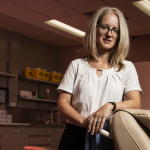- The International Progressive MS Alliance has just announced 19 new Research Challenge awards to tackle progression of disability in MS.
- Priority was given to new avenues for understanding progression, towards new treatments for progressive MS.
- Two Australian researchers, Dr Jessica Fletcher and Professor Jeannette Lechner-Scott, were among the world-class award recipients.
Progressive MS is a form of MS that tends to gradually worsen over time. More than half of the 2.8 million people with MS worldwide have a progressive form of MS, and yet there are very few treatment options to address this critical need. One of the main roadblocks to developing new therapies for progressive disease is a poor understanding of the underlying biological processes involved in MS progression.
The International Progressive MS Alliance
The International Progressive MS Alliance was formed in 2014 to rally the global community around the unmet needs of people with progressive MS. As a founding and managing member, MS Research Australia is embedded in this global collaboration of MS organisations, researchers, health professionals, the pharmaceutical industry, companies, trusts, foundations, donors and people with MS to find solutions. The International Progressive MS Alliance drives this through innovation, global leadership, and funding. One major funding scheme, known as the Research Challenge Awards, promotes exploration of new avenues to more deeply understand progression.
https://www.youtube.com/embed/0kaBEou09Ho
The Research Challenge awards: Innovation is key
The aim of the Research Challenge awards is to better understand mechanisms that drive the progression of MS, so we can find new therapeutic targets and ultimately slow or stop progression of disability. The 19 awards just announced will fund new ideas up to €75,000 (AUD $118,000) for one year, and includes new insights into the loss of nerve fibres in progressive MS, and molecular pathways that promote protection of nerves, and repair of the myelin sheath. All of these factors are crucial in understanding how and why MS progresses. The awards represent a total research investment by the Alliance of €1,425,000 (AUD $2, 249,000) with two of the new projects led by Australian researchers.
https://www.youtube.com/embed/ytBbRc65m70
Mapping the pathways driving myelin repair
Dr Jessica Fletcher is an early career researcher focusing on understanding the biology behind repair of the myelin sheath. Disability progresses in people with MS when this conductive coating around the nerves is lost, resulting in damage and ultimately the death of the nerves. To be able to reverse this, we need to better understand how myelin growth normally occurs, and the signals within the cell that drive repair of the myelin sheath. To achieve this Dr Fletcher will grow myelin-producing cells in the laboratory and analyse their response to brain growth factors. Her project will track the activation of signalling molecules inside the cell, allowing her to map the sequence of events involved in myelin growth. This will provide critical new information towards designing therapies targeting the myelin-producing cells to drive myelin repair and prevent MS progression.
Does environmental imprinting alter the progression of MS?
Professor Jeannette Lechner-Scott’s project is trying to tease out why some people with MS have mild disease, while others progress more rapidly. This may be due to a combination of genetic makeup and lifestyle factors or environmental exposures, such as smoking. This study will investigate the link between lifestyle/environment and genetics, by testing a type of molecular mechanism called epigenetics. Whilst a person’s DNA code doesn’t change, the way that it is interpreted by different cells in the body does. Epigenetic factors bind to the DNA code and give the cell instructions on reading it; for example, whether to make more or less of certain molecules inside the cell.
Epigenetic factors change based on our lifestyle and environment. They reflect a lifetime of environmental exposures and may be the missing link to why some people develop progressive disease while others do not. In this study, Professor Lechner-Scott’s team will compare epigenetics between people with MS who progressed rapidly versus those experienced milder disease. In particular, they will look at the epigenetics within immune cells called monocytes that contribute to destruction of myelin in MS. The results of this work will help us to understand the biological changes involved in disease progression.
Professor Alan Thompson, Chair of the Alliance Scientific Steering Committee, said “We are greatly encouraged by the high quality and diversity of the funded projects. Successful results from these studies will greatly accelerate the development of new treatments for people with progressive MS.” Ultimately, it brings us one step closer to understanding and better management of progressive forms of MS.






